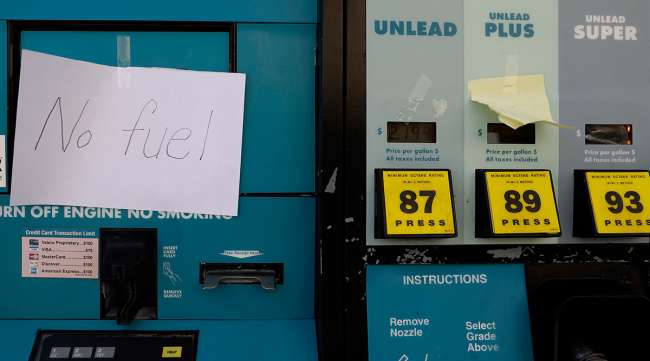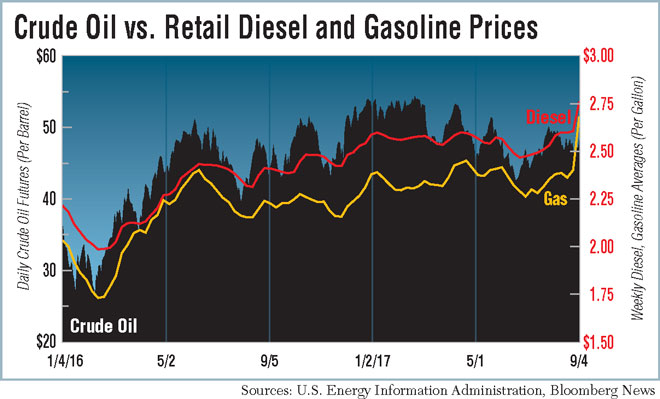Senior Reporter
Diesel Soars 15.3 Cents to $2.758 a Gallon; Gas Up 28 Cents

The U.S. average retail price of diesel vaulted 15.3 cents to $2.758 a gallon — its largest jump in 6½ years — as demand spiked while refineries in the Houston area reported difficulty restarting operations after the stubborn flood left by Hurricane Harvey.
The average price of regular gasoline surged too, up 28 cents a gallon.
Meanwhile, Hurricane Irma, a catastrophic Category 5 storm with 185 mph winds that struck the Caribbean and was moving toward Florida on Sept. 7, could further impact fuel costs. That storm, described as one of the most powerful ever recorded, has potential to cause massive damage and disrupt fuel just-in-time supply chains in an area heavily dependent on ships bringing fuel from Gulf Coast refineries. And, another tropical storm, Jose, was on its heels.
US avg #diesel price on 9/04 UP 15.3¢ to $2.758/gal over last week. See data: https://t.co/x6ymhoUfJu #Radio spots: https://t.co/4l8MGwIsh9
— EIA (@EIAgov) September 6, 2017
Port Everglades in Fort Lauderdale, Fla., reported Sept. 6 petroleum tankers and ocean-going barges were continuing to deliver gasoline, diesel, jet fuel and other fuel products to the port, slightly north of Miami.
“While gas stations may be running low on fuel, the petroleum companies that operate at the port will continue delivering fuel as long as it is safe for their drivers and they maintain an adequate reserve supply. The petroleum companies will begin releasing their reserve supply once the storm passes and it is safe to make deliveries,” a port statement said.
A "few" Florida Rock & Tank Lines trucks were even receiving police escorts to gas stations, an assistant to CEO Rob Sandlin said Sept. 7. The company is No. 12 on the TT list of top tank truck companies.
The latest price was the biggest weekly jump since March 7, 2011, when diesel rose 15.5 cents to $3.871. The cost is the highest since July 20, 2015, when it was $2.782.
Diesel now costs 35.1 cents more than it did a year ago, when it was $2.407 a gallon, the Department of Energy said Sept. 4.
The increase in diesel prices rippled across the country.
Prices for trucking’s main fuel climbed by at least 10 cents in all regions except in the Rocky Mountain area, where it rose by 8.1 cents.

The U.S. average price for regular gasoline rose 28 cents to $2.679 a gallon. It costs 45.6 cents more than it did a year ago, DOE’s Energy Information Administration said, adding other spikes across the nation were in line with previous ones after hurricanes since 2000.
Weekly gasoline prices rose in all regions, the highest spike being 40.7 cents a gallon in the Lower Atlantic region. It also increased 38.6 cents in the East Coast and 35 cents in the Gulf Coast areas, respectively.
Several refineries in the Houston area remained shut down as of Sept. 6, and others were running at reduced rates, EIA added.
However, Colonial Pipeline’s system carrying fuel to the South and Eastern states was restored as of Sept. 5, according to the company.
“Suffice it to say, [diesel] supply is going to be pretty tight through much of Texas and up into the Mid-Atlantic for the short term here,” said Denton Cinquegrana, chief oil analyst at Oil Price Information Service. “It sounds like downtime; all things considered. Its not going to be overly long — measured in days and weeks through the rest of this month, at least.”
Factors such as providing cleanup and supplying the rebuild in affected areas drives up demand for diesel, he said.
The record 52 inches of rain had yet to drain fully even as Hurricane Harvey moved on after its first landfall Aug. 25 in Houston and the surrounding area.
“There’s just water on every road. We are have a couple of our [truck terminal] operations that are operating in the Houston area, but the one in the Beaumont area is not operating now,” Trimac Transportation Chief Operating Officer Bill Marchbank told Transport Topics on Sept. 1.
Trimac, a tank truck and bulk commodities carrier, operates about 300 tractors and 700 trailers to serve Beaumont, Houston and San Antonio.
Trimac Group ranks No. 45 on the Transport Topics Top 100 list of for-hire carriers in North America. The company is based in Calgary, Alberta.
Valero Energy Corp. reported Sept. 4 its Corpus Christi and Texas City facilities were at pre-hurricane rates, and its Three Rivers operation continued to ramp up operations. In Houston, production will increase as transportation and logistics infrastructure becomes more available.
ExxonMobil Co. reported Sept. 5 it had engineers in Beaumont to help the city restore its flooded municipal water system. Also, it continued to work on a restart at its Baytown refinery, which it said was the largest petrochemical complex in the country.
“We have seen a fair amount of refinery capacity return online, but there still is a significant amount that is offline between the Houston-Beaumont-Port Arthur region,” Andy Lipow, president of Lipow Oil Associate in Houston, told Bloomberg News.
“We are starting to get people back to work and some sense of normalcy,” Trimac’s Marchbank said. “And in a situation like this, that’s really what you need.”
Also, oil prices still remained below $50 a barrel, despite increasing from a week earlier.
West Texas Intermediate crude futures on the New York Mercantile Exchange closed at $48.66 on Sept. 4, compared with $46.57 on Aug. 28.




